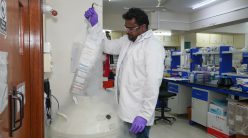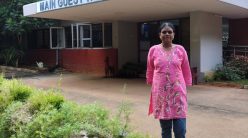CONNECT spent a day with Amita Sneh who coordinates international relations
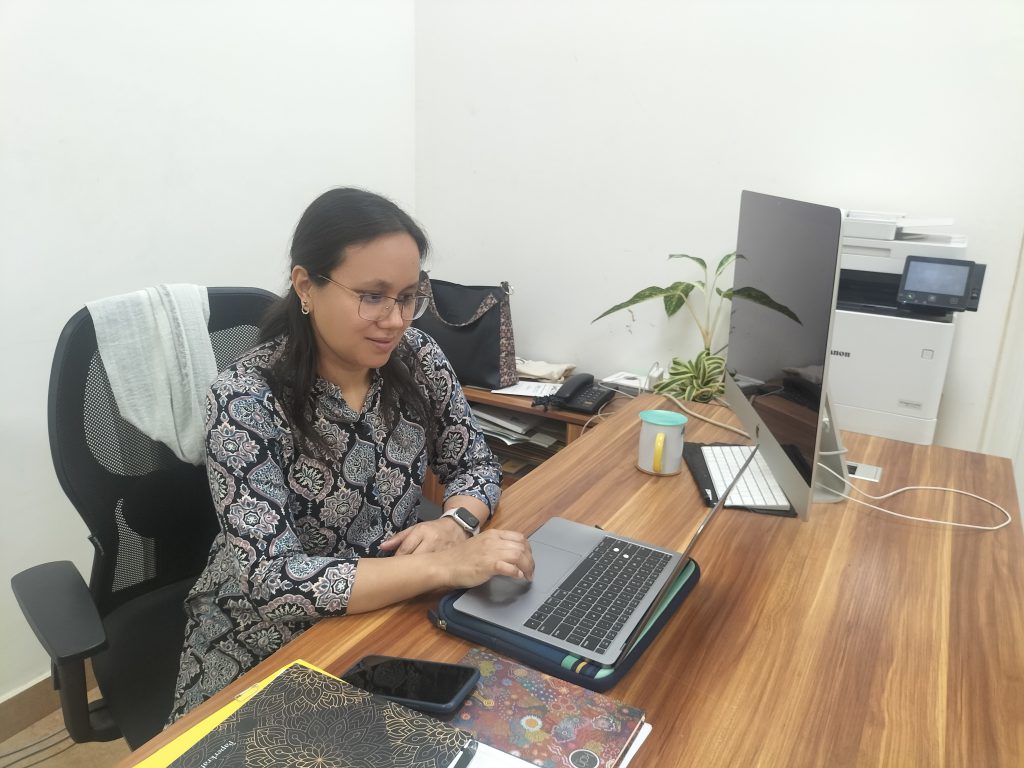
Amita enters her cabin with a hurried stride, carrying her big tote bag. Sanjeev, the contractor, was already waiting to have a conversation. He is in charge of renovating the new space for the Office of International Relations (OIR) at the Raman building. Amita insists upon a few things and presses on him to expedite the renovation. OIR has to shift to the new building in two days. Amita then responds to several emails and attends three phone calls back-to-back. At 9.30 am, OIR is already buzzing with activity, foreshadowing an eventful day. “Not just today, there are so many things happening at the office, every day, all the time,” says Amita.
‘There are so many things happening at the office, every day, all the time’
Amita Sneh is the Chief International Officer at OIR. Hailing from Himachal Pradesh, Amita moved to Bangalore in 2013 as a postdoc at DBT-InStem at the National Centre for Biological Sciences (NCBS). Before that, she had already completed two postdoc stints at the Nationwide Children’s Hospital and Ohio State University, Columbus. After a year at NCBS, she realised that her interest veered more toward administrative roles than research and academics. She discussed her plan to shift careers with a couple of mentors at NCBS, who suggested that she apply for a role at the Office of International Relations, IISc. Amita took up their suggestion and applied, and was called to appear for an interview. She aced the job interview. For the past eight years, she has assumed various responsibilities at OIR.
It is almost 10.30 am now, and Amita starts walking to the Main Building for an interactive session with 12 high school students from the Royal Academy, Bhutan. As part of her work at OIR, Amita frequently interacts with student groups from various parts of the world who visit IISc with the prospect of getting admission. On her way, she runs into Abhishek Kumar Singh, the current Chair of OIR, and the two share several updates.
Recognising the role of international relations in improving the global outreach of its faculty members and students, IISc formed OIR in 1998. Currently, a nine-membered committee oversees its operations. The office staff includes Amita, two Assistant International Officers (AIOs), one Secretarial Assistant and an office boy. The induction of the two AIOs has considerably helped, as previously it was solely Amita’s responsibility to shoulder most of the tasks. Amita says that work has now become “more structured and swifter than before.”
By the time Amita arrives at the Main Building, the students from Bhutan have finished watching a short film on IISc. Before that, OIR had arranged an interaction with a Bhutanese student who is presently pursuing her PhD at IISc. The students were visibly enthralled by the natural beauty of the campus. They had several questions for Amita related to admission and student life on campus. Astrophysics and biotechnology were favourites for several of them. They were also curious to know if IISc had theatre, music and other cultural activities. Amita answered each question in detail.
The Bhutanese students were then provided with snacks and refreshments. They would now visit a few laboratories led by Debasmita Behera, one of the AIOs. The students did not miss clicking several selfies and group photos in front of the iconic Main Building before leaving.
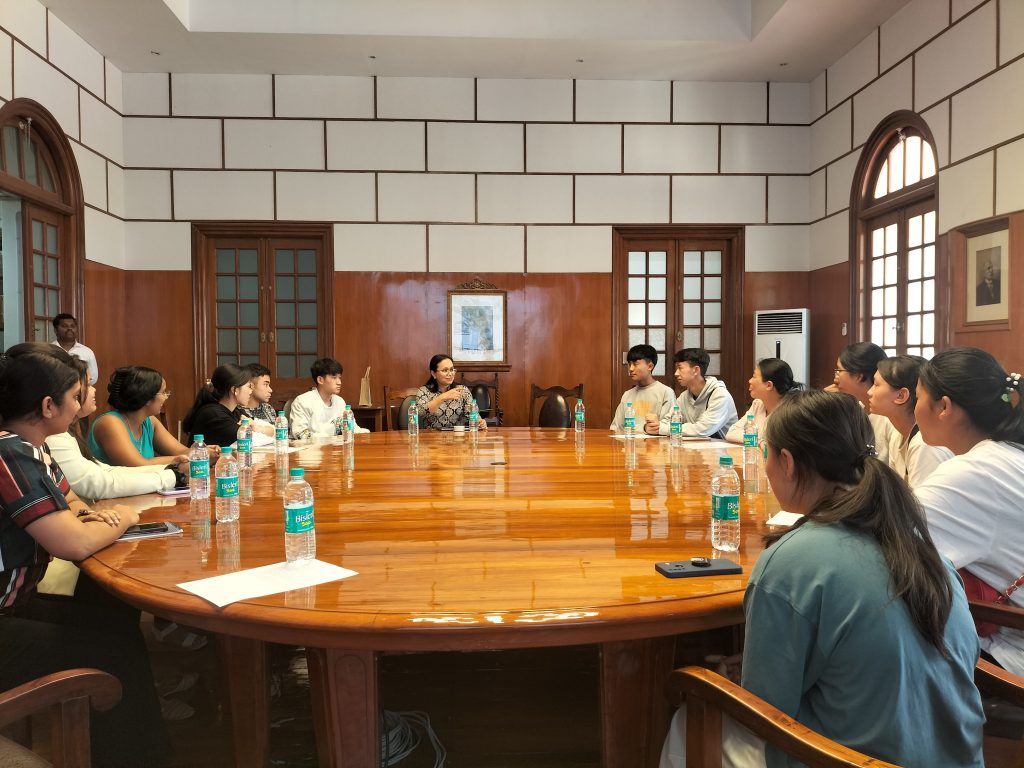
IISc hosts foreign nationals through various graduate and postgraduate programmes such as BSc (Research), BTech, MTech, MDes, MMgt, MSc, PhD and MTech (Research) programmes, with admissions through entrance tests. OIR helps these foreign students settle into life on campus and encourages their participation in various activities.
Amita feels that international exchange is strategically crucial for a higher education institute. “International students often act as ambassadors for their institutions, enhancing their global recognition. They also bring diverse perspectives, enhancing the learning environment of the institute. The presence of international students boosts alumni networks, which further strengthens professional networks,” she says.
Presently, IISc has international students from Nepal, Bangladesh, Sri Lanka, Iran, Turkey, Ethiopia, Syria, Nigeria, Zambia, Bhutan, Egypt and Japan, plus a few students from the USA and UK with Overseas Citizenship of India (OCI) status. This year, students from Germany and Ecuador have also been admitted.
Amita proceeds to the Raman building to check on the progress of the new OIR office renovation. Carpenters are still working on the conference room table, and other furniture is yet to arrive. It looks like another week would be needed for the office space to become fully functional.
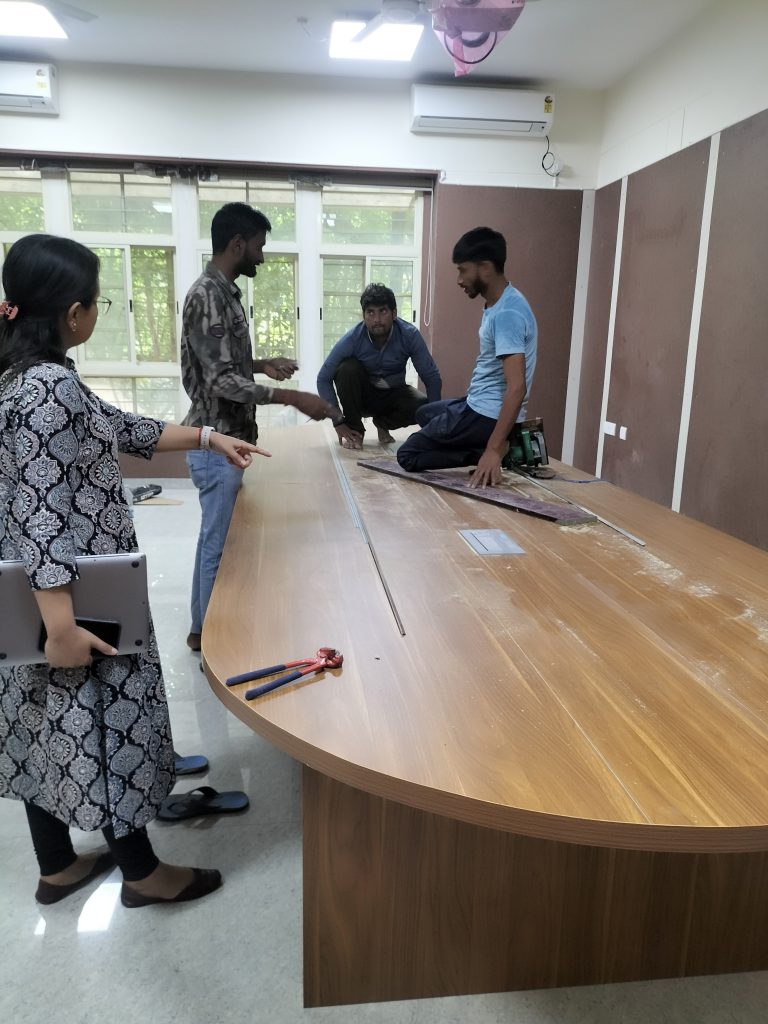
Amita recalls that as a new joinee back in 2016, one of her first tasks was to set up their present office space, the one that they share with the Office of Development and Alumni Affairs. She had made many trips to KR market to purchase the sofas, tables and chairs. The former OIR Chair, Usha Vijayraghavan, got the very aesthetic Athangudi tiles shipped from Tamil Nadu. The building was once Satish Dhawan’s official residence – his daughter Jyotsna Dhawan was Amita’s colleague at DBT-InStem. “When Jyotsna visited IISc, she fervently shared titbits about their stay in the building … where their living room was, which was their study room,” Amita recalls cheerfully.
It is past 1 pm now, and it is lunchtime. Amita and the two AIOs, Debasmita and Swetha K, who share the same cabin, take out their lunch boxes containing home-cooked meals. Between mouthfuls, they share light personal banter as well as important official updates. Amita prefers to cook her own meals herself. Her morning starts at 5 am. She prepares her and her daughter’s breakfast and packs their lunches.
‘International students often act as ambassadors for their institutions, enhancing its global recognition’
Amita finishes her lunch, puts together a file and proceeds towards the DIGITS building for a meeting at 2.30 pm. This is with the Rankings committee – data on admissions and progress of international students play a crucial role in deciding the Institute’s rank.
At the meeting, Amita provides an update on various activities of OIR. The focus of OIR has been on increasing the number of full-time and short-term students and faculty members on campus through targeted outreach plans, global networking, and wider advertisement of IISc’s programmes. Venugopal S, Chief Data Officer at IISc; Suresh Balutagi, Deputy Librarian; GR Jayanth, faculty member in the Department of Instrumentation and Applied Physics, and Abhishek Singh, the Chair of OIR were the other members present in the meeting.
Amita’s work at OIR covers a wide range. This includes exploring new academic partners, maintaining existing collaborations in education and research, and connecting with global scientific networks. She is also the nodal person for facilitating the Institute’s full-time, co-supervised and joint doctoral programmes, as well as seed funds, exploratory workshops and seminars with partner institutes.
Amita’s work at OIR covers a wide range –exploring new academic partners, maintaining existing collaborations in education and research, and connecting with global scientific networks
It is past 4 pm when the meeting at DIGITS ends. Amita walks back to her office. The next couple of hours are filled with telephone calls from students and faculty members. There have been days in her office when she has had to face emergencies, sometimes related to guidelines for foreign nationals and sometimes related to the health of international students. “As there are no said rules and we need to act on the spot, there is no chance of making any mistakes,” Amita explains.
Amita feels that although OIR has come a long way, there is still scope to improve. “We need to advertise our fully-funded programmes, interdisciplinary ecosystem, continuously evolving curriculum, world-class facilities and internationally trained faculty through outreach and global networking,” she says. She feels that all their present efforts need to be exponentially stepped up.
As another busy day at the office ends, Amita books a cab to go home. It is 6 pm now and booking a cab at this peak hour takes some patience. After a few cancellations, she receives confirmation from one of them. Amita re-organises the stationery on her table one final time and leaves to board the cab for the hour-long journey to reach her home in Yelahanka. Her calm demeanour masks the multitude of thoughts occupying her mind about the next day’s schedule.



